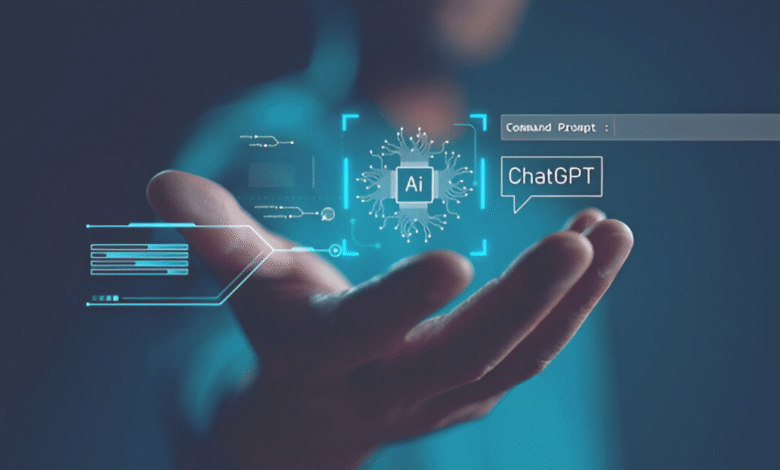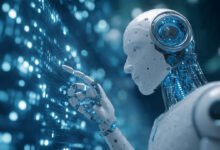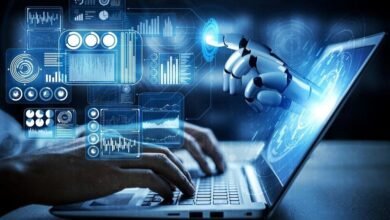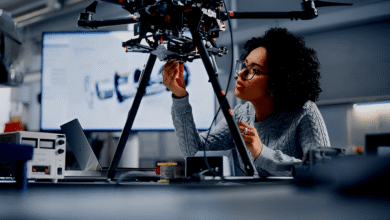Artificial Intelligence in Everyday Life: 9 Real-World Use Cases You’re Missing
Artificial Intelligence in everyday life transforms how we live. Discover 9 surprising real-world AI applications you encounter daily but not notice.

Artificial Intelligence (AI) is no longer just a buzzword it’s deeply embedded in our daily routines, often working behind the scenes to make life easier and more efficient. From personalized recommendations on streaming platforms to voice-activated assistants in our homes, AI-powered technologies are revolutionizing how we interact with the world. Yet, many of its most impactful applications go unnoticed. In this article, we’ll uncover nine surprising ways Artificial Intelligence in everyday life is transforming industries, enhancing convenience, and solving real-world problems.
While most people associate Artificial Intelligence with virtual assistants like Siri or Alexa, its influence extends far beyond. Businesses leverage machine learning algorithms to predict trends, healthcare providers use AI for early disease detection, and cities deploy smart systems to optimize traffic flow. Whether you realize it or not, AI is shaping your experiences in retail, finance, transportation, and more. By exploring these hidden use cases, we can better appreciate how AI in everyday life is driving innovation and improving efficiency across multiple sectors.
Artificial Intelligence in Everyday Life
Smart Home Automation
Modern homes are becoming increasingly intelligent, thanks to AI-driven automation. Devices like smart thermostats (e.g., Nest) learn user preferences and adjust temperatures automatically, saving energy. Similarly, AI-powered security systems use facial recognition to distinguish between family members and intruders. These systems analyze behavioral patterns, sending alerts only when necessary, reducing false alarms. Voice-controlled assistants like Google Home and Amazon Echo rely on natural language processing (NLP) to understand and execute commands. Over time, these systems adapt to speech patterns, improving accuracy.
Personalized Healthcare Diagnostics
Artificial Intelligence is revolutionizing healthcare by enabling early disease detection and personalized treatment plans. Machine learning models analyze medical records, genetic data, and imaging scans to identify conditions like cancer or diabetes at earlier stages. For example, IBM Watson Health assists doctors in diagnosing complex cases by cross-referencing vast medical databases. Wearable devices like the Apple Watch use AI to monitor heart rates, detect irregularities, and even predict potential health risks. AI-powered chatbots provide instant medical advice, reducing unnecessary hospital visits. By streamlining diagnostics, AI improves patient outcomes while cutting healthcare costs.
Fraud Detection in Banking
Financial institutions use AI-based fraud detection to safeguard transactions. Predictive algorithms analyze spending habits, flagging suspicious activities in real time. For instance, if a credit card is used in an unusual location, the system may block the transaction and alert the user. Banks also employ behavioral biometrics, tracking typing speed and mouse movements to verify identities. AI-driven risk assessment helps lenders evaluate loan applications more accurately, minimizing defaults. These advancements enhance security while ensuring seamless customer experiences.
Artificial Intelligence in Retail & E-Commerce
Online shopping platforms leverage Artificial Intelligence to deliver personalized recommendations. Amazon’s recommendation engine analyzes browsing history and past purchases to suggest relevant products, boosting sales. Similarly, dynamic pricing algorithms adjust costs based on demand, competition, and user behavior. Chatbots handle customer inquiries, while computer vision enables virtual try-ons for clothing and cosmetics. AI also optimizes inventory management, predicting stock requirements to prevent shortages. These innovations create smoother, more engaging shopping experiences.
Traffic Optimization & Autonomous Vehicles
AI plays a crucial role in reducing traffic congestion. Smart traffic lights use real-time data to adjust signal timings, improving flow. Navigation apps like Google Maps employ machine learning to suggest the fastest routes based on current conditions. The rise of self-driving cars relies on AI-powered sensors and deep learning to interpret surroundings. Companies like Tesla and Waymo are refining autonomous technology, promising safer, more efficient transportation.
Artificial Intelligence in Agriculture
Farmers use AI-driven precision agriculture to maximize yields. Drones equipped with computer vision monitor crop health, detecting pests or diseases early. Predictive analytics forecast weather patterns, helping farmers plan irrigation and harvesting. Robotic harvesters automate labor-intensive tasks, while AI-powered soil sensors optimize fertilizer use. These innovations promote sustainable farming and food security.
Artificial Intelligence in Content Creation
From AI-generated articles to deepfake videos, artificial intelligence is reshaping media. Tools like ChatGPT assist writers by generating drafts, while platforms like Canva use AI to design graphics. Streaming services like Netflix recommend shows based on viewing habits, enhancing user engagement. While concerns about authenticity exist, AI’s creative potential is undeniable.
Artificial Intelligence in Customer Service
Businesses deploy AI chatbots to handle routine inquiries, reducing wait times. These bots use NLP to understand and respond to customer queries accurately. Advanced systems even detect emotions, improving interactions. Voice assistants in call centers analyze speech patterns to route calls efficiently. By automating repetitive tasks, AI allows human agents to focus on complex issues.
AI in Energy Management
Smart Grid Optimization
AI enhances power grid efficiency by analyzing real-time energy demand and supply data. Machine learning algorithms predict consumption patterns, balance loads, and prevent outages by automatically rerouting power. This reduces waste and ensures stable electricity distribution across networks.
Predictive Maintenance for Energy Infrastructure
AI-powered sensors monitor equipment like turbines, transformers, and solar panels, detecting potential failures before they occur. By analyzing vibration, temperature, and performance data, AI schedules maintenance proactively, minimizing downtime and repair costs.
Energy Consumption Analytics for Homes
Smart meters and AI-driven platforms track energy usage patterns, providing insights to optimize consumption. Machine learning suggests efficiency improvements, such as adjusting HVAC systems or shifting high-energy tasks to off-peak hours, helping users cut costs and reduce carbon footprints.
Renewable Energy Forecasting
AI improves the reliability of solar and wind energy by predicting weather conditions and energy output. Advanced models analyze historical and real-time data to optimize renewable energy storage and grid integration, ensuring consistent green power supply.
Demand Response
Utilities use AI to incentivize reduced energy use during peak demand. Automated systems adjust smart appliances, industrial machines, and building systems in real time, lowering strain on the grid and preventing blackouts.
Gas Exploration
AI analyzes seismic data and drilling reports to identify optimal extraction sites, reducing environmental impact and operational risks. Predictive analytics also help monitor pipeline integrity and prevent leaks.
Energy Storage Optimization
AI manages battery storage systems by determining the best times to store or release energy based on pricing and demand fluctuations. This maximizes the value of stored renewable energy and extends battery lifespan.
Carbon Emission Tracking
AI tools measure and analyze emissions across industries, suggesting cleaner energy alternatives and efficiency strategies. Smart algorithms help companies meet sustainability goals by optimizing energy use in manufacturing and logistics.
Decentralized Energy Management
AI enables self-sufficient microgrids (e.g., in remote areas or campuses) by autonomously balancing local solar, wind, and battery systems. It prioritizes renewable sources and seamlessly switches to backups during shortages.
Read More: Top 10 Free AI Tools in 2025 That Are Blowing Minds
Conclusion
AI in everyday life has evolved from a futuristic concept to an indispensable force shaping our daily experiences. As we’ve explored, its applications span from smart home automation to advanced healthcare diagnostics, fraud prevention to personalized shopping experiences. These real-world implementations demonstrate how AI-powered solutions are not just convenient, but often revolutionary solving complex problems, saving time, and even saving lives in ways we might not always notice.
The rapid advancement of AI in everyday life promises even more transformative changes on the horizon. While ethical considerations and privacy concerns remain important discussions, the benefits – increased efficiency, enhanced safety, and improved decision-making – are already making our world smarter and more connected. As we continue to adopt and adapt to these technologies, one thing is clear: AI is no longer just a tool, but an integral, intelligent partner in how we live, work and interact with our environment.
FAQs
How is Artificial Intelligence used in smart homes?
Artificial Intelligence powers smart devices like thermostats and security systems that learn your habits, automate tasks, and optimize energy use for greater convenience and efficiency.
Can AI really improve healthcare?
Yes, AI assists in early disease detection, analyzes medical scans, and powers wearable devices that monitor health metrics in real time.
How does Artificial Intelligence prevent banking fraud?
Artificial Intelligence detects unusual transactions by analyzing spending patterns and uses behavioral biometrics to verify identities, blocking fraud instantly.
What role does Artificial Intelligence play in online shopping?
Artificial Intelligence personalizes recommendations, enables virtual try-ons, optimizes pricing, and manages inventory to enhance your shopping experience.
Will Artificial Intelligence replace human jobs?
While Artificial Intelligence automates repetitive tasks, it primarily augments human work by handling data analysis and routine queries, allowing people to focus on complex problem-solving.











